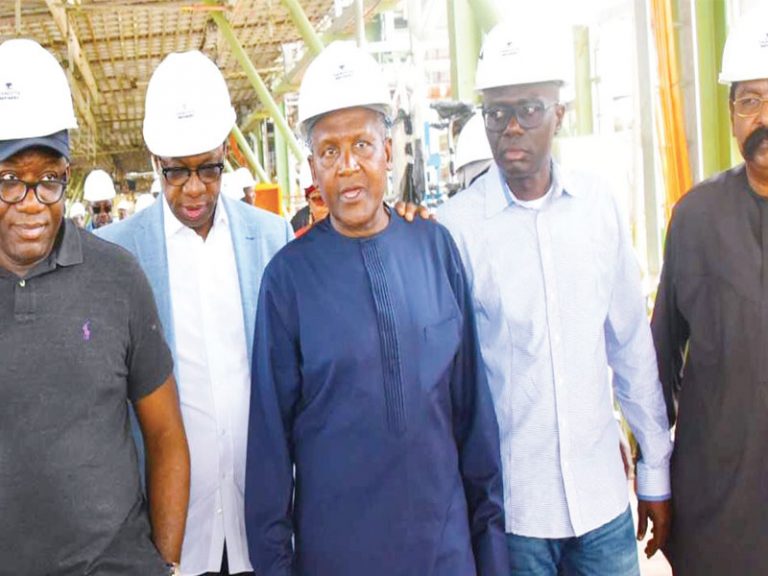Ten governors on the platform of the Nigerian Governors
Forum (NGF) friday visited the Dangote Refinery and
Petrochemicals at Ibeju-Lekki in Lagos, stating that it is a
pride to Nigeria and Africa.
The governors, led by the Forum’s chairman, who is the
Governor of Ekiti State, Dr. Kayode Fayemi, described the
Dangote Refinery and Petrochemicals as a salute to
entrepreneurship.
Fayemi said the project would contribute immensely to the
economic growth of the nation and provide employment to
thousands of Nigerians.
He said: “This is an inspirational initiative by the President of
the Dangote Group, Mr Aliko Dangote. It demonstrates the
possibility where the government provides the enabling
environment with the way the Lagos State government has
done for individuals that are serious-minded and have what it
takes to excel
“This is an individual that has put together a $12 billion
project that we have toured almost throughout the day and
had to cut it short to be able to attend to other businesses.
“This is pride in Africa and not just to Nigeria. I don’t know
anywhere in Africa you will find a complex such as this.
Read Also: Why FCT 2020 Budget Was Increased To ₦278bn – Kyari
“I don’t think that there are many places in the world where
you will find a complex as comprehensive and extensive as
the one we have been privileged to tour.
“We are all looking forward to the products that will come
out from this place; the plastics, the oil from the refinery and
the fertilizers for our agriculture.”
The NGC chairman was accompanied on the visit by
Governors Babajide Sanwo-Olu of Lagos; Godwin Obaseki,
Edo; Dapo Abiodun, Ogun; Simon Lalong, Plateau; Okezie
Ikpeazu, Abia; Bala Mohammed, Bauchi; Abdulrahman
Abdulrazak, Kwara; Babagana Zulum, Borno; Nasir El-Rufai,
Kaduna and Ivara Esu, Deputy Governor of Cross River.
Fayemi said state governments’ investment in agriculture
would be given a boost by the fertilizer plant which is the
largest in Africa.
He urged governments to continue to create an enabling
environment through the right incentives and policies, as well
as provision of infrastructure needed to attract investors to
their states.
Also speaking, Sanwo-Olu commended Dangote for deciding
to put the strategic investment in Lagos, adding that the
government would continue to do its best to support the
smooth completion of the project.
“This project is sited close to the Lekki Free Trade Zone and
Lekki Deep Sea Port and we are bringing development to our
people.
“Part of the things we are doing here is to bring a
comprehensive new infrastructure to the communities. We
are closing up on two different road connections out of this
place. One will go to Epe, and another one will go to Ijebu
Ode and back to Lagos.”
The Lagos State governor added that the government planned
to open up the place so that people could come and work,
live and contribute to the economy.
Welcoming his guests, Dangote thanked the governors for the
visit to the facilities and assured them that the group would
continue to invest in Nigeria to create jobs and make all
Nigerians proud.
“We will continue to make sure that we are the ones that will
lead and others will follow. We want to bring all our monies
to Nigeria and invest where we belong to,” he said.
Dangote, however, urged the governors to focus on the areas
of health, education and capital development, adding that
these sectors should be part of their key responsibilities to
their people.
Mr Devakumar Edwin, Executive Director, Strategy, Capital
Projects and Portfolio Development, Dangote Group, said all
the states would benefit from the three million metric tonnes
per annum fertiliser plant because it would improve the
agricultural sector.
Edwin noted that the 650,000-barrels-per-day refinery could
meet 100 per cent of Nigeria’s requirement of all petroleum
products and that there would be surplus for export.
“The refinery project will create 1,600 permanent jobs and
100,000 indirect jobs. It will save Nigeria over $7.5 billion
annually through import substitution,” he said.
THISDAY










